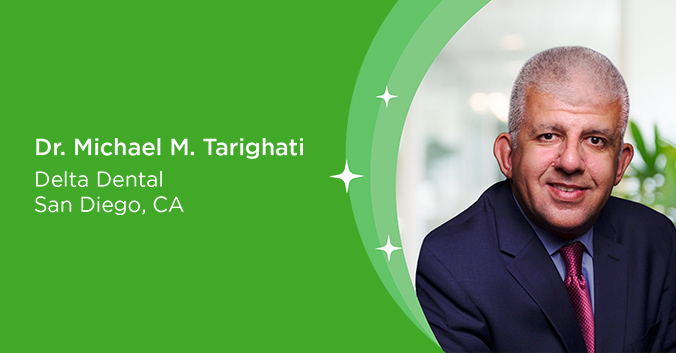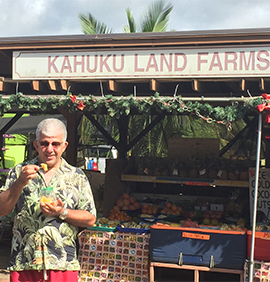
Dental consultant spotlight: Dr. Michael Tarighati
Dr. Michael Tarighati doesn’t believe in education ending after college or dental school. He has spent his entire career learning more about the profession he loves, having completed multiple residencies, fellowship, mastership, and even a master’s degree on top of his dental degree.
With more than 1,100 hours of clinical and practical continuing education courses, Dr. Tarighati is among the top 3% of dentists practicing in the U.S. and applies this knowledge as a dental consultant for Delta Dental. Passionate about quality, he works to make sure patients receive the best care possible.
We caught up with Dr. Tarighati to ask about his background and approach to quality dentistry.
Tell us a little about yourself.
I was born in London, England, and lived in Iran and Germany as a child. I graduated from Tufts University School of Dental Medicine in Boston, where I also completed my first year of general practice residency (GPR). I did an additional year of postgraduate work in geriatric dentistry at Boston University’s Goldman School of Dental Medicine.
I completed a second-year general practice residency at Veterans Affairs Medical Center in Los Angeles. And then, the horrific events of 9/11 happened. I felt compelled to do something positive, so I joined the U.S. Navy, serving as a dental officer.
I received my fellowship and mastership in the Academy of General Dentistry and later got a master’s degree in public health, concentrating in health care administration. I’ve worked in various positions in dentistry from private practice to managing dental offices. Those jobs took me to places such as Boston, Los Angeles, Clearfield, Utah and San Diego, where I currently live. I’m now working as a dental consultant with Delta Dental.
Why did you decide to become a dentist?
I saw a lot of dentist’s offices as a kid, having had my share of unpleasant dental experiences. Back then, you only went to the dentist if there was a problem. This sparked my interest in dentistry. My father was a psychiatrist, and I grew up surrounded by all his surgeon friends and medical professionals.
My father told me that whatever I do, I need to do it well and be the best in that profession. I was good at science, and I decided that I wanted to go into the dental field and be effective by furthering my education and learning as much about dentistry as I could.
Providing dental care to patients is only part of our job as dentists. It’s part science, part chemistry and part art. It’s engineering. It’s technology and psychology, and even business and customer service. For dentists, we have to excel at all these and use them to make our patients’ lives better.
What do you do at Delta Dental?
I’m a dental consultant, which means I adjudicate claims and work with other departments when issues of fraud, waste, abuse and quality come up. I’m also on several policy and quality committees.
So, you focus on quality issues. What is the biggest barrier to achieving quality in dentistry?
With new dental products reaching the market, it’s important to be familiar with their application and use them with a solid research background.
Some of the smallest things can make the biggest difference. When performing restorations such as fillings or crowns, dental composites and cements play a big role in whether the procedure is successful. Composite placement and crowns can create a challenge, because if you don’t use a rubber dam to contain moisture, those restorations may fail. That can cause additional problems, and you’ll have to redo the restoration.
You received advanced training in geriatric dentistry. What do you see as the challenges facing older adults and their dental health?
Older adults face unique challenges. Some of these challenges are physical, such as arthritis, which may leave patients unable to effectively brush their teeth, and some are due to medications such as antihypertensive drugs, which tend to cause dry mouth. Luckily, a dentist with advanced training in geriatric dentistry can address these issues, such as recommending electric toothbrushes for patients with arthritis, prescribing dry mouth relief lubricants and keeping a close eye on the patient’s dentition.
You’ve been named one of America’s top dentists for several years. What is the key to being a great dentist?
The first thing that comes to mind is to be a good listener. Each patient is unique, and their needs and wants differ. Only after listening to what issues the patient is presenting with and what is a priority for them should the dentist prioritize their treatment recommendations.
I also believe that a dentist, once taking the oath of dental practice upon graduation from dental school, must make a pact with himself or herself to be ethical and engage in quality continuing education courses to gain more knowledge and put it to practice.
What do you like to do in your free time?
I enjoy spending time with my beloved wife and two daughters, whether it’s just accompanying them shopping or eating with them. I like to cook different foods, including pasta with made-from-scratch meat sauce and alfredo sauce, as well as steak, burgers, curry and Persian food.
I also enjoy gardening, photography and traveling to new cities and countries. My favorite places include London, England; Paris, France; Las Vegas; Washington, D.C.; and the Hawaiian Islands, especially Oahu.

Congratulations to Delta Dental’s own Michael Tarighati, DMD, MAGD, MPH, on being named our Dental Health Partner of the Month! Thank you for taking the time to share your thoughts with us.
Recent posts
- Oral health care for seniors: Improving access, improving outcomes
- Simplify your credentialing with CAQH: Check out our webinar recordings
- Updated 2026 CDT codes are here
- View our CDT 2026 Updates webinar and stay on top of code changes
- EFT will become our standard payment method starting 1/1/27
- Start the year strong: Key reminders to support your practice in 2026
- Discover 3 tips to power up your practice with new workflows
- Updated 2026 CDT codes are here
- Partner with us to improve the health outcomes of our shared members
- Say hello to our 2026 Medicare Advantage DHMO partners
